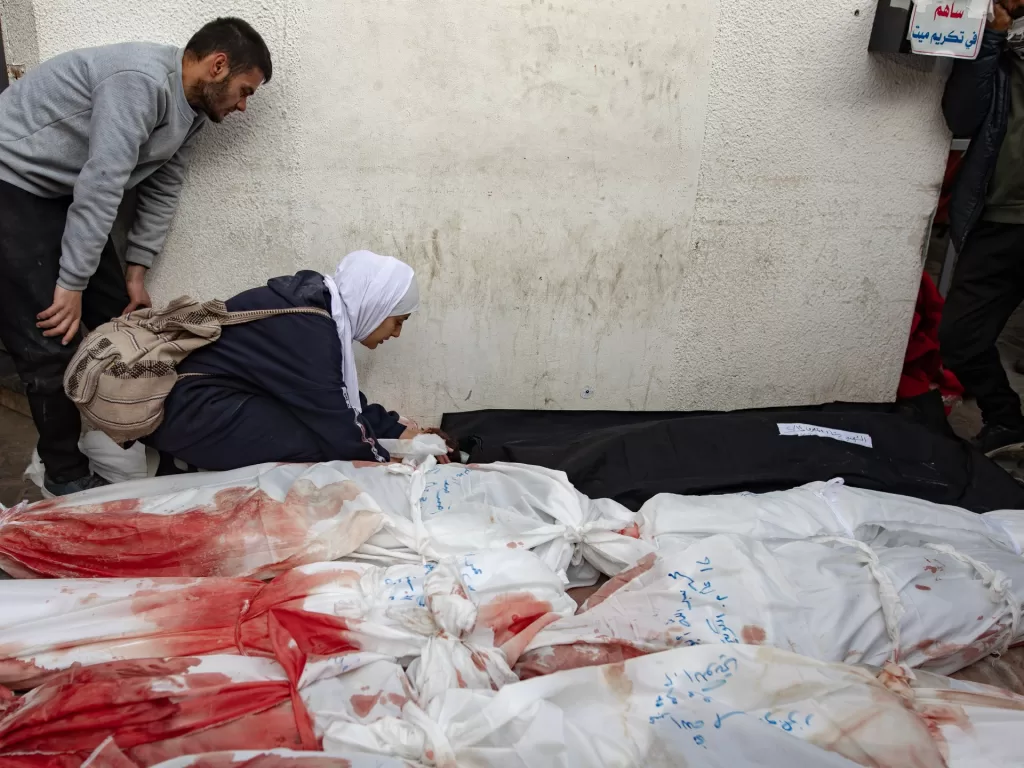In Cairo, Egyptian President Abdel Fattah el-Sisi held talks with CIA Director William Burns and Qatari Prime Minister Sheikh Mohammed bin Abdulrahman bin Jassim Al Thani aimed at agreeing a truce, protecting civilians and delivering more aid into the enclave, Egypt’s state information service said on Tuesday.
In a statement on its website, it cited a “keenness to continue consultation and coordination” on the key issues, indicating that no breakthrough was made. Israeli representatives were also present at the talks.
Meanwhile in Gaza, Israeli forces are planning a ground assault on the 64sq km (25sq miles) southernmost city of Rafah.
Rafah, whose pre-war population was about 300,000, now teems with about 1.4 million people, many living in tent camps and makeshift shelters after Israel declared the city a “safe zone” while it bombarded areas in north and central Gaza for four months.
No plan to evacuate civilians safely has been forthcoming and aid agencies say the displaced have nowhere else to go in the shattered besieged territory.
“Where are you going to evacuate people to, as no place is safe across the Gaza Strip, the north is shattered, riddled with unexploded weapons, it’s pretty much unlivable,” Juliette Touma, a spokesperson for the United Nations Palestinian refugee agency, UNRWA, said.
Rafah under threat
Israeli tanks shelled parts of Rafah for the second night in a row, causing waves of panic, residents said.
Dozens were killed in overnight attacks on Monday. On Tuesday, two journalists, including an Al Jazeera Arabic correspondent, were targeted. A photojournalist working with him was also wounded in an Israeli air raid in northern Rafah.
Amid threats of an Israeli ground assault, hundreds of displaced families have started to leave Rafah.
“I fled al-Maghazi, came to Rafah, and here I am, returning to al-Maghazi,” said Nahla Jarwan, referring to the coastal refugee camp from which she fled earlier in the conflict.
Rafah neighbours Egypt, but Cairo has made clear it will not allow a refugee exodus over the border.
Gaza health officials announced 133 new Palestinian deaths in the past 24 hours, bringing the total to 28,473 killed and 68,146 wounded since October 7, when about 1,200 people were killed in a Hamas attack across the border into Israel, triggering the offensive.
Inconclusive talks
While the truce talks took place in Egypt on Tuesday, a Hamas official told Al Jazeera that no delegation from the group was present at the talks. “We are still awaiting the results of the ongoing meetings in Cairo, and communications are continuing with the mediators,” Hamas said.
A Palestinian official told the Reuters news agency the sides are looking for “a formula that will be acceptable to Hamas, who says it is only possible to sign a deal once it is based on an Israeli commitment to ending its war and pulling out its forces from the Gaza Strip”.
The official said Hamas had told the participants it does not trust Israel not to renew the war after the Israeli captives in Gaza are released.
The captives were seized in Hamas’s raid into southern Israel on October 7. Securing their return is a priority, according to Prime Minister Benjamin Netanyahu’s government, as well as wiping out Hamas, which governs the enclave that has been under a crippling blockade for 17 years.
“It’s still a little too early to tell exactly how close we are to a deal, but we do know that the Israeli delegation does include the head of Israel’s Mossad, the external security agency, and the Shin Bet, the internal security and intelligence agency,” Al Jazeera correspondent Hamdah Salhut reported from occupied East Jerusalem.
Also on Tuesday, South Africa said it had asked the International Court of Justice (ICJ) to consider whether Israel’s plan to extend its offensive into Rafah required additional emergency measures to safeguard the rights of Palestinians.
In a case brought by South Africa, the ICJ last month ordered Israel to take all measures within its power to prevent its troops from committing genocide against Palestinians in Gaza. Pretoria’s government voiced concern that an offensive in Rafah would result in further large-scale killing, harm and destruction.
US President Joe Biden said on Monday that Washington was working on a hostage deal to bring “immediate and sustained” calm to Gaza for at least six weeks. Biden has urged Israel to refrain from a Rafah offensive without a viable plan to protect civilians.
